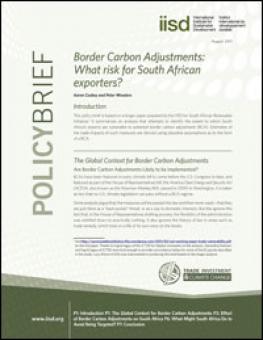
Border Carbon Adjustments: What Risk for South African Exporters?
This policy brief, based on a longer analysis prepared by the IISD for South African Renewable Initiative, estimates the costs that would be borne by South African exporters in various sectors if the U.S. and/or the EU implemented border carbon adjustment (BCA) policies.
Using plausible assumptions about the characteristics of any eventual BCA scheme, it identifies the vulnerable sectors, and shows what costs each would bear assuming current production methods and trade flows. It ends by speculating about the ways in which South African exporters might avoid such charges, should BCA ever be implemented.
Participating experts
You might also be interested in
Agreement on Climate Change, Trade and Sustainability: A landmark pact for trade and sustainability
The ACCTS pact, signed by Costa Rica, Iceland, New Zealand, and Switzerland, aligns trade and environmental policies, tackling fossil fuel subsidies, eco-labels, and green trade.
Addressing Carbon Leakage: A toolkit
As countries adopt ambitious climate policies, this toolkit examines strategies to prevent carbon leakage—when production and emissions shift to nations with weaker climate policies—and explores the trade-offs of each approach.
IISD Trade and Sustainability Review, December 2024
This edition of the IISD Trade and Sustainability Review presents four expert perspectives on how agricultural support and subsidies can promote sustainability in developing and least developed countries.
Why Trade Matters in the Plastic–Pollution Treaty Negotiations
The global push to end plastic pollution by 2040 highlights the critical intersection of trade and environmental action, with upcoming INC-5 negotiations focusing on reducing plastic production, consumption, and waste within a fair and effective international framework.